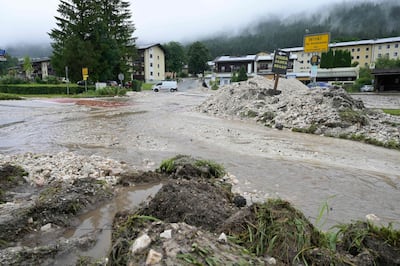Europe’s deadly flooding spread further south on Sunday, with high waters in southern Germany and Austria prolonging the misery of a disaster that has killed more than 180 people.
Record rainfall battered parts of Bavaria, a German state on the border with Austria, causing flash floods which left at least one person dead.
In Austria, the historic town centre of Hallein was under water and emergency workers were on high alert for flooding in the Salzburg and Tyrol regions.
Further north, rescuers expect to find more bodies in those parts of Germany that bore the brunt of the devastation.
Visiting one of the stricken areas on Sunday, German Chancellor Angela Merkel described the flooding as terrifying.
"It is a surreal, eerie situation," she told reporters. "The German language can barely describe the devastation that's taken place."
More than 150 people died in western Germany in the past five days. Dozens more were killed in neighbouring Belgium.
Rescue crews in both countries were sifting through rubble in dangerous conditions to find victims and survivors.
The floods disrupted communications across two German states, making it harder to account for missing people.
The authorities were working to restore gas, electricity and telephone services. Damaged buildings were assessed, but some will have to be demolished.
Police sent divers to recover bodies that were swept away in the torrents. In some areas, soldiers used armoured vehicles to clear the debris.
A similar clean-up was under way in Belgium where a dozen buildings collapsed in the town in Pepinster and some homes were left without electricity.
The authorities are concerned about the supply of drinking water in Belgium, which will hold a national day of mourning on Tuesday.

Tens of thousands of people who were taken to safety in the Netherlands could be allowed to return home after dykes are inspected.
But as waters receded in the west, concern shifted to the south where incessant rains inundated basements and made rivers burst their banks.
The German authorities said one person died in the Berchtesgadener Land region of Bavaria, which was hit by record rainfall and ensuing floods.
Water levels in parts of Austria’s Western Tyrol province were at their highest for 30 years, with rains in the country set to continue on Sunday.
People trapped in their homes in Austria had to be taken away by boat or truck, although there were no reports of injuries or deaths.
Extreme rainfall also battered Luxembourg and Switzerland, where parts of the country remained on flood alert on Sunday.
In the east German state of Saxony, the authorities reported significant risks in several villages near the Czech border.
The floods have become an election issue two months before Germany goes to the polls, with climate change becoming a central topic in the campaign.
Scientists believe that climate change increases the risk of extreme weather, but determining its role in this week’s rainfalls will take time.
Mrs Merkel, who is retiring from politics after September's polls, said Germany had to "get faster in the fight against climate change".
Candidates from Germany’s main parties visited the flood-hit regions with promises of relief and solidarity.
It evoked memories of a famous episode in 2002 when the chancellor at the time, Gerhard Schroeder, took charge of a flood crisis shortly before an election by touring inundated areas in rubber boots, helping him to a comeback victory.
Armin Laschet, who is leading Mrs Merkel’s party into this year's election, called for green policies to be accelerated in the wake of the floods.
But he came under fire after footage showed him laughing with colleagues while German President Frank-Walter Steinmeier delivered a sombre statement on the flooding.
Mr Laschet, the governor of one of the states most affected by the flooding, apologised on Saturday and said his jolly demeanour was inappropriate.



















